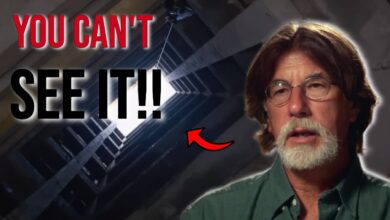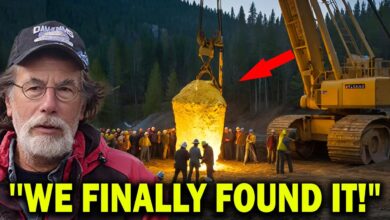Rick Lagina Just Discovered Oak Island’s $50 Million Treasure
Rick Lagina Just Discovered Oak Island’s $50 Million Treasure

Go ahead, Roger.
Yeah, the guys would like you to stop drilling right now. Let’s pull the rods out. Let’s clean out the filings. Make sure everything goes in a bag and see what we can see.
Off the coast of Nova Scotia lies a place steeped in mystery. Oak Island. For centuries, whispers of buried treasure, sacred relics, and a deadly curse have lured explorers into its depths. Many came with hope. Most left with nothing. Some never returned at all.
Among those who tried, one man’s story was almost lost to history. Anthony Lagginina. He wasn’t chasing fortune blindly. With an engineer’s mind and an unshakable belief, he dug deeper than almost anyone before him. And what he uncovered was no legend: buried timbers, a stone-lined vault, shards of pottery, and a fragment of parchment inked with strange letters. Even traces of gold glimmered in the dark.
For a brief moment, the greatest mystery in North America stood ready to be revealed. But Oak Island struck back. Hidden flood tunnels roared to life. Chambers collapsed. Anthony barely escaped, and his discovery was sealed away once more. He told no one. Decades later, his grandsons Rick and Marty Lagginina would stumble upon his journals and the truth.
Make sure to subscribe and join us because this story may change how you see history forever.
The year is 1983. The air on Oak Island is sharp with salt and mystery, the wind carrying whispers of centuries-old secrets. Across the narrow causeway, a weathered pickup truck grinds to a halt. Its driver steps out slowly, his boots sinking into the cold gravel. His name is Anthony Lagginina.
Anthony is no stranger to this island. Decades earlier, as a young man, he had stood in the very shadow of the Money Pit, his heart pounding at the thought of buried treasure and ancient mysteries. But life had pulled him away. Work, family, obligations. Now older, but not broken, he has returned. His back is straighter than his years should allow, and his eyes burn with the fire of a man who knows he doesn’t have many chances left.
This, he believes, will be his final attempt, his last chance to solve the mystery that has consumed him since his youth. The Money Pit looms before him. Not just a scar in the ground, but a symbol of every dreamer who had come before him and every tragedy that followed. Six lives already claimed. Legends of curses carved into the very earth.
But Anthony isn’t afraid. He carries something stronger than fear: determination. By his side is a small team—men he trusts, men who believe in his vision, but who also know the danger of digging into Oak Island’s belly. Their tools are modest: shovels, lanterns, pulleys, and an old drilling rig that groans with every rotation. This is not a government expedition, nor a millionaire’s hobby. This is personal.
Anthony leads them to a point just off the traditional Money Pit site, a place his research, maps, and gut instincts tell him is key. The ground is soft with years of neglect. But beneath, he believes, lies a shaft older than memory—a shaft that once held something unimaginable.
As dusk settles over the island, Anthony sets the first shovel into the soil. The sound echoes like a heartbeat against the still air. Every clump of dirt lifted feels heavier than stone, as if the island resists their intrusion. By lantern light, they dig through roots, clay, and rock until the outline of a timber structure begins to emerge.
The team pauses. Anthony runs his calloused hand across the damp wood—beams blackened with age, cut with tools not seen for centuries. His voice is low, steady, but laced with awe: “We’re standing at the edge of history.”
A silence falls among the men. In that moment, they are no longer just workers or dreamers. They are trespassers in a story written long before their time. And Anthony knows it. But he presses on. For him, Oak Island is not just legend. It is legacy. And tonight, under the weight of moonlight and mystery, Anthony Lagginina has returned to claim his place in the island’s untold history.
The dig stretched late into the night, lanterns glowing like fireflies in the blackness of Oak Island. For hours, Anthony and his team battled through layers of earth, clay, and stone. Sweat ran into their eyes, mixing with the salt of the sea air. The deeper they went, the heavier the silence grew. Every sound—the scrape of metal on rock, the groan of the pulley—seemed amplified, as though the island itself was listening.
At nearly 90 ft, Anthony’s shovel struck something different. A hollow thud, sharper than dirt, duller than stone. The men froze. The lanterns swayed in the wind, shadows stretching long over their tired faces. Anthony knelt, brushing away the soil with calloused hands. Beneath the dirt lay oak timbers, darkened with centuries of dampness, stacked deliberately—not by nature, but by man.
Anthony’s chest tightened. He had read of these before—the platforms described in old accounts. Layers of oak placed every 10 ft as if to guard what lay below. But this was no copy of a story. He was seeing it with his own eyes, touching it with his own hands. Proof.
With care, the team pried back the beams until the earth gave way to something astonishing: a stone-lined wall curving into the shaft like the edge of a hidden vault. The stones were cut and fitted with precision, their edges smooth even after centuries underground. Anthony ran his fingers along the damp rock and whispered to himself, “Someone built this to last.”
When the first gap opened between the stones, the lantern lights spilled into the chamber beyond, and the ground revealed its secrets. Half buried in mud lay shards of ancient pottery, their faded designs hinting at cultures long gone. Nearby, tucked into a crevice of stone, was a fragment of parchment, its edges frayed but still legible. Latin letters, bold and defiant, whispered across the surface—evidence of language, history, and purpose.
Anthony’s hand trembled as he held it up to the light. Centuries of storms, floods, and collapses had not erased this fragile clue. Then came the discovery that left them speechless. Wedged into the corner of the vault, half-rotted yet unmistakable, was the fragment of a wooden chest. Its edges were reinforced with rusted iron bands. The metal corroded but still clinging to form.
Anthony brushed the mud away with his sleeve and for the first time glimpsed what so many had only imagined: the corner of a treasure chest crafted by human hands, hidden in the depths of Oak Island. The men stood in silence, their lanterns flickering against the wet stone. The chamber smelled of earth, salt, and time itself. This was not rumor. This was not theory. This was proof.
Anthony pressed his palm against the chest remains, his eyes wet with something between exhaustion and triumph. For years he had chased shadows, theories, legends. But now, with fragments of pottery, parchment, and chest in his grasp, he knew something massive lay below, something worth hiding, something worth dying for.
The air in the vault grew colder, the silence heavier. The island seemed to breathe around them, as if warning that the deeper they went, the greater the danger would become. But Anthony Lagginina did not turn back. He had waited a lifetime for this, and he would go further.
The vault was silent, but for the sound of Anthony’s shallow breathing. His lantern flickered against the damp stone, casting warped shadows across the chamber. His trembling hand hovered over the broken corner of the chest. He could almost imagine it: coins stacked in the dark, jewels buried beneath rot and soil, or documents that could rewrite history.
He signaled to his men. “We lifted carefully.” The team adjusted ropes, slid iron hooks into place, and braced themselves for the heave. As the chest fragment groaned against the earth, the chamber gave a sudden, violent shudder. From deep below, a hollow roar began, soft at first, then building like the sound of a thousand rushing rivers.
Anthony froze, his eyes widened. He knew that sound. “Back! Back!” he shouted. But it was too late. From the cracks between the stones came a torrent of seawater, blasting into the chamber with unstoppable force. The lantern hissed as the water swallowed the floor, black and freezing, rising with terrifying speed. The air filled with the stench of salt and decay.
The men panicked, clawing at the slick shaft walls. The ropes snapped under the pressure. Gear toppled, and the half-exposed chest was swallowed by the surge. Anthony stumbled, his legs dragged under, his lungs burning as icy water surged around him. For a moment he thought the island would claim him then and there, another victim of its infamous curse.
By sheer will, he clung to a timber, pulling himself toward the shaft as the chamber collapsed behind him. Mud and stone crumbled, sealing what lay below with a deafening crack. His team scrambled upward, coughing, gasping, soaked to the bone. When they finally emerged into the night air, Anthony collapsed onto the damp earth, his chest heaving as though he had surfaced from the grave itself.
The island was silent again, the wind whispering across the trees. The moonlight shimmered on puddles of seawater that had no business being there. The vault, the parchment, the pottery, the chest—all was lost beneath the flood.








